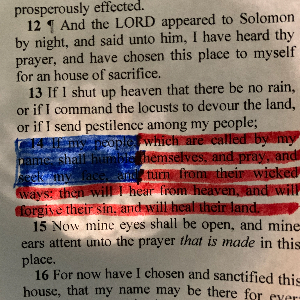The Mark of a Man

Whither shall I go from thy spirit?
or whither shall I flee from thy presence?
~ Psalm 139:7
Holmes, of course, is the famous fictional detective and his actions and preoccupations appear most singular, but they were a part of his life’s work. He had a theory on a case in Doyle’s short story, “The Adventures of Black Peter.” Nonfictional detectives, investigators, and forensic scientists research and test various ways of ending life. They find out such things as that it is impossible to crush a human skull with your bare hands. If I recall correctly, it takes somewhere around 1,100 pounds of pressure to crush a human skull, but certainly more pressure than a human being can produce with his hands alone.
We can safely conclude that Cain did not crush Abel’s skull, at least not with his bare hands. To crush his brother’s skull, Cain would have had to use a very heavy object like a big rock, which would’ve been difficult to wield in a close quarter fight. Of course, Cain didn’t have to crush Abel’s skull to kill him. He could’ve caused enough blunt force trauma to do that with a smaller rock, a tree limb, or some of his farming tools, since he was a worker of the soil (Genesis 4:2). Maybe Abel’s death didn’t involve his cranium directly. Perhaps Cain used a stone knife, or throttled his brother with his bare hands. I suppose a spear could’ve been thrown, or used as a lance. We can probably rule out a slower weapon such as poison. Though Cain obviously thought of this act beforehand (Genesis 4:5-7), the language of Genesis 4:8 lends itself to a crime of passion and some sort of fatal act.
Read more
The War on Exposition

And if ye go to war in your land against the enemy that oppresseth you, then ye shall blow an alarm with the trumpets; and ye shall be remembered before the LORD your God, and ye shall be saved from your enemies.
~ Numbers 10:9
Know your enemy and know yourself
Sun Tzu was born during the Babylonian captivity of the southern kingdom of Judah, though he was silent on that subject. He probably wanted to maintain his impartiality. He was a Chinese military general, adviser, and war strategist. His name is known to us today because he is credited with writing the classic, The Art of War. His book is a perennial source for strategizing and conflict management, as well as military tactics. Many modern business, marketing, self-help, and motivational gurus have grown rich by repackaging his philosophies and peddling them to those who want to get ahead in life.Sun Tzu was a firm believer in knowing your enemy and yourself. He warned that failing to know your enemy would lead to as many losses as victories and failing to know yourself puts you in jeopardy in every battle. By knowing your enemy, Tzu referred to knowing your enemy’s capabilities, his strengths and weaknesses. The same holds for knowing your own strengths and weaknesses.
Having a known and named enemy can also be useful for tribal reinforcement. Giving your enemy a name creates a rallying point and defines a target for aiming at. Having a named, common enemy can provide strategic partnerships. Even Pilate and Herod could get along when they were both against the same thing (Luke 23:12). If you’re driving the bus out of town, you can fill the seats with malcontents who will push and shove to board that bus without worrying about where it’s going. But where is the bus headed? That’s the question.
Read more
The Write-In Campaign

And of the children of Issachar, which were men that had understanding of the times, to know what Israel ought to do; the heads of them were two hundred; and all their brethren were at their commandment.
~ 1 Chronicles 12:32
– Everybody every election year Four years ago many conservative Christian voters in America faced a crisis choice. Donald Trump was running for president and the Republican party failed to mount any serious challenge to his campaign. We laughed when he entered the race and thought there was no way he would be on the ballot by November. Once all the chads were counted, Donald Trump was the Republican nominee running for president against the Democratic nominee, Hillary Clinton.
In the early going, many conservative Christians had vowed on foundational principles they would never vote for Donald Trump. The terrifying prospect of a Hillary Clinton presidency, though, spring-fed water at about the midst of that block wall foundation. Directly, Donald Trump wasn’t all bad. He had a way of talking to his political opponents and the liberal media that made us snicker to our buddies. Never mind that spring produced both sweet and bitter water, he was saying some things out loud that many have wanted to say but lacked the courage or opportunity, or perhaps the sense of impropriety.
The prospect of draining the swamp and making ‘Murica great again began to resonate. Maybe some of those economic ideas weren’t so bad. The idea of American Made sounded good and decreasing foreign dependencies wasn’t a hard sell. Building a wall was something that somebody in the Bible somewhere was once in favor of, so that had to be good. Plus, a bunch of liberal celebrities were supposed to renounce U. S. citizenship should Trump win the election. That would be fun. Many embraced the inevitable and thought it was time to hold the nose and pull the lever.
Not HaHa Funny
But then something funny happened. Pinched noses became flared nostrils, supplying the lungs with abundant inflation to bellow full-throated support for Donald Trump. He was embraced and openly promoted. But it got stranger still. No longer were conservative Christians merely hopeful that the President’s policies would be good for the country, many are convinced Donald Trump is God’s choice instrument to restore America.
Some brethren of the more zealous sort are conducting a vigorous write-in campaign for Donald Trump. From pulpits and presses we have listened to Donald Trump being compared to the Persian King Cyrus, who issued the decree allowing Jews to return to Jerusalem. Trump has been compared to famous revivalists and reformers in Israel, like Jehu and Josiah. His “sufferings” have been viewed as messianic persecutions against a righteous leader who would establish justice in the land. The blessed hope of his presidency is the supposed appointment of righteous judges to the Supreme Court so there shall be justice from sea to shining sea. They have thus far stopped short of calling him God’s anointed. Something about that doesn’t set quite right, but they haven’t put their fingers on it yet. That may not be far off though.
The New Crisis
This brings us to the new crisis for conservative Christians. The new crisis isn’t quite like the old crisis. No, no. The old crisis involved a choice for the lesser of two evils … Ah, the lesser of two evils … Those were good times and simpler times. No, the crisis choice now is for the greatest of goods, for the trueness of conservatism. Loyal support for Donald Trump has become the new badge of conservatism and rightness. Never-trumpers today are mocked and dismissed. Such pestilent fellows are fit for nothing but treasons, stratagems, and spoils. The crisis choice is not whether to be a conservative, but what kind of conservative to be.
The deep divides in this country extend to the ranks of conservatives. We have political conservatives, economic conservatives, moral conservatives, and probably many more than I can recall. There is no necessity for any of these to overlap. They can, but they don’t have to. Conservative Christians giving unabashed support to Donald Trump have clearly chosen to move more conservative, whether we call it political, social, economic, moral, etc.
Of course, they must needs find justification in Holy Writ for such exuberance and support for Donald Trump as missio Dei. The great irony in all this is that efforts to become more conservative politically have resulted in becoming biblically liberal. Liberal expositors mishandle, misuse, twist, and even rewrite Scripture to suit their purposes and justify their choices. Such support for Donald Trump has bent and crimped the Scripture and rewritten the biblical narrative to tell us all about what God is doing to save and restore America. Is that what the Bible is about? Conservatives cry out for textualists on the Supreme Court, but apparently textualists aren’t needed in church behind pulpits.
Not About Voting
I don’t care who you vote for in November. Voting is a right, a privilege, and a free choice of conscience. You will account for your stewardship before God, as will I. But, don’t tell me how Donald Trump is “like Jesus” and voting for him is sure to dispatch the signalmen to the middle of America so they can direct the New Jerusalem to set down somewhere between Chicago and New York. Don’t misuse the Bible to tell me how God plans the salvation and restoration of America. Don’t insert Donald Trump into the lines of Scripture so that he runs parallel the heroes of the faith. Be a conservative. A biblical conservative. Conserve the original contextual meaning of the text of Scripture.
How did we all the sudden get so many biblical liberals among conservative Christians? That’s a good question and my first suggestion would be that it hasn’t been as all the sudden as you might think. Mix together a penchant for spiritualizing Scripture, a neglect of contextual exposition, a habit of using the Bible for support, and a strong dose of Americanism, and you have a recipe for all sorts of textual tampering and tomfoolery.
The pulpits in small conservative churches in America left the text decades ago in favor of tribalistic indoctrinations. They’ve been mishandling the Bible this way for years. What is all the sudden about it is mishandling it to justify a politician, as if his presidency is some sort of holy quest.
The pulpits and pews are more attuned to the conservative news outlets than they are the 66 books. The Bible tells us repeatedly not to put our trust in horses and princes, but every four years we’re assailed by professing Christians telling us how this is the most important election and if we don’t elect this or that candidate all is lost.
We all need to calm down and have a long hot soak in Proverbs and Ecclesiastes. We need to listen to the story the Bible is actually telling and quit trying to write America and Donald Trump into the narrative of Scripture. Write-ins are for ballots, not for Bibles.
The Bible has things to say to America, as well as it does to China, Mexico, Canada, Zambia, and Chile. However, the Bible is not about America. God has made no covenant with America, nor promised this new land to her founding fathers. Actually studying the Bible will show that America is not a nation per se, at least not in the biblical sense. America is not an ethnicity or family, it’s a melting pot. There is only one man who will establish justice on the earth and cover it with God’s glory. He is the King Jesus Christ. He is God’s Anointed and the Bible is about him.
Forbidding Water

Can any man forbid water, that these should not be baptized, which have received the Holy Ghost as well as we?
~ Acts 10:47
I don’t have much more to go on than the text of the article, and that’s what I want to interact with. I am using the text as the article was sent to me in Word format. The article contained 3,647 words in 21 paragraphs. I will put the text of his article in blockquotes and number the paragraphs in brackets for reference, e.g., [1]. I do this in hope I don’t misrepresent him and to help anyone interested to follow the interaction. Hereafter, I will address Bro. Enyedi directly.
The Problem Stated
[1] Some time ago I learned about a practice among our churches which is strange to us: that of baptizing young children. We in Romania were perplexed when we heard of it because it seems to us so contrary to the strong stands our kind of churches take on baptism and church truth. We expressed our concerns both in private and public. Since this practice seems to be gaining more of a foothold, we would like to call everyone’s attention to the potential harmful effects that such a practice may have in the life of individuals and in our church life. Some may find this article offensive and think it exaggerated, but I wish it would be perceived as a token of our love and appreciation for our sister churches in the U.S. All I ask is that they give us a fair hearing.
The problem identified is “baptizing young children,” and since you qualified the churches as, “our churches,” and “our kind of churches,” I am assuming you mean Sovereign Grace Landmark Baptist Churches. It is important to note that my remarks are not concerning Southern Baptists, or any other groups, or the Arminian practices of high-pressure child evangelism. The tone of the opening gives the impression this problem is something of an epidemic in the United States among “our churches.” It may be a big problem, but I am unaware of it. Most of the churches I am aware of here are hardly baptizing anybody, much less young children.
The opening paragraph ends with a request for a “fair hearing.” I infer from your request for a fair hearing that you are also inclined to give a fair hearing, which would be a discussion and the reason I am interacting with your article in this open way.
Read more
The Better Revelation

God, who at sundry times and in divers manners spake in time past unto the fathers by the prophets, Hath in these last days spoken unto us by his Son, whom he hath appointed heir of all things, by whom also he made the worlds;
– Hebrews 1:1-2
So the Old Testament scriptures are about Christ. That doesn’t mean they aren’t literally true or historically accurate. To say Christ is better doesn’t mean the Old Testament is bad or worthless. As we will see in studying this letter, the Old Testament is incomplete. It is a shadow of something greater to come. That greater substance is Jesus Christ.
Think of it this way. Imagine a husband is separated from his wife for a long time due to military service. While they are apart, the only means of communication they have is by mailed letters. During that time, the wife cherishes those letters and reads them many times. The letters increase her anticipation for her husband’s return home. When her husband finally returns, does she run out to meet him or does she stay in her room reading the letters? The letters were good in their time and place but once the husband returns, she would rather have him than the letters.
Likewise, the Old Testament is pointing to the coming of Christ and building anticipation. Once He is revealed, the substance supersedes the shadow. This doesn’t render the Old Testament untrue or useless, but it can never be looked at the same way again. Everything is now viewed through the lens of Jesus Christ, His life, death, resurrection, and return.
The opening verses of this first chapter immediately establish the foundation and trajectory of this letter. The author divides time into two great epochs in which God has spoken, or revealed Himself. The second epoch being through His Son is greater than the first. This sets up the continual comparison and contrast we have throughout this book.
Read more
The Letter to the Hebrews

God, who at sundry times and in divers manners spake in time past unto the fathers by the prophets, Hath in these last days spoken unto us by his Son, whom he hath appointed heir of all things, by whom also he made the worlds;
– Hebrews 1:1-2
This letter has several unique features among the New Testament epistles. There is no introductory greeting in the text. We don’t know exactly when it is written or from where it was written. We don’t know who wrote it. I know this is a contentious issue, but we will get to the authorship question in a few moments. We don’t know exactly whom it was written to and where they were located. There are some clues to those questions in the text but they only provide general answers or hints.
Further, this letter is more like a series of sermons than a letter until you get to the very end. The author does call it a “word of exhortation” (Hebrews 13:22). This book also contains the only reference to Timothy’s imprisonment we have in the New Testament (Hebrews 13:23). This letter has the only reference to Melchisedec in the New Testament. In fact, it is one of only three references in the entire Bible. The other two references are in Genesis and the Psalms.
This book also has some notable features. It is not about preaching in the sense that it is a homiletic textbook, but it is a great example of biblical preaching. The author quotes and refers to Old Testament passages and expounds them throughout the letter. It is noteworthy that the author quotes from the Old Testament and gives the quotes as God, Jesus, or the Spirit speaking. There is a scarce reference to David in reference to a Psalm but mostly the book quotes the Old Testament as God speaking. Read more
Solomon’s Floating Front Porch

Wherefore let him that thinketh he standeth take heed lest he fall. ~ 1 Corinthians 10:12
We know Solomon was a master architect and builder, but did the wisest man figure out how to build a standing structure on no support whatsoever?
Solomon conducted a grand experiment, perhaps the grandest. He gives a brief summary of his experiment in Ecclesiastes 2:1-11. An experiment is conducted to test or prove something. What was Solomon trying to prove? For that, we need to go back to chapter 1 and allow the preacher to state his problem and define his terms.Ecclesiastes 1:1-11 states the problem he experiments to overcome. He names the problem vanity and vanity of vanities (Ecclesiastes 1:2), and spends the following nine verses defining his terms. Vanity can be quickly defined as empty or meaningless. Some are quite satisfied with that and immediately assume Ecclesiastes teaches us that everything on earth is empty and meaningless, so we are best to avoid as much as possible. Of course, if that is the case, we really need nothing beyond the second verse of the book, we Christians are the most pitiable and miserable of men (1 Corinthians 15:16-19), and “let us eat and drink; for tomorrow we die” (1 Corinthians 15:32). This is a tricky business, but how can we hope to make proper sense of his experiment, initial findings, musings, and final conclusion, if we do not pay attention to his definitions? Read more
The Unforgiving Servant

But if ye bite and devour one another, take heed that ye be not consumed one of another. ~ Galatians 5:15
Jesus answered, “I say not unto thee, Until seven times: but, until seventy times seven” (Matthew 18:22). He then proceeded to illustrate forgiveness with a parable that serves a few purposes. It provides a narrative illustration, which makes an impression. It highlights the basis for forgiveness and concludes with a sober warning to the unforgiving.
Before we look into the parable, let’s have a few words about parables in general. We have to be careful with them that we let them make their point and not try to press them too far. Sometimes people want to pick up every detail in the parable, no matter how minor, and try to tie it to some significant teaching. This can do more harm than good and possibly lead into serious error.
In the parable before us, Jesus is not laying out a whole theology of forgiveness, nor seeking to explain fully how God forgives sinners and reconciles them to Himself. This is an important point to understand, as we will see later on. The context clearly indicates this parable is about forgiveness between men and particularly brothers in Christ. The conclusion in verse 35 confirms this.
At the very least, this parable speaks to the child of God about how we are to handle forgiveness toward others. The parable does not try to get into every possible scenario of offense. We can all appreciate how tangled and thorny situations between people can be. But the point of this parable is clear: We are to forgive one another.
Read more






